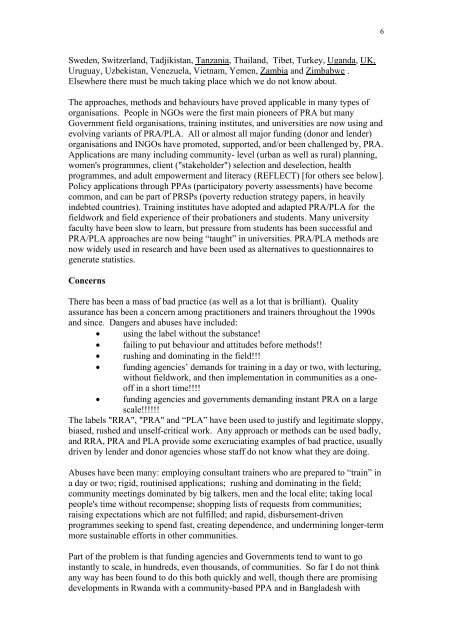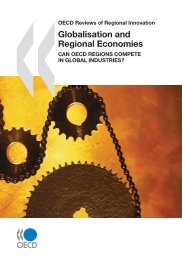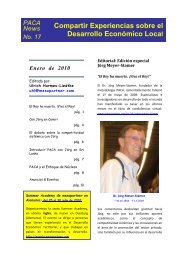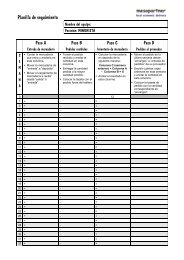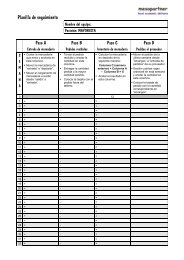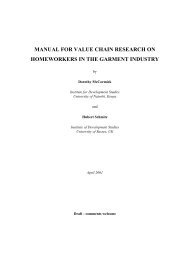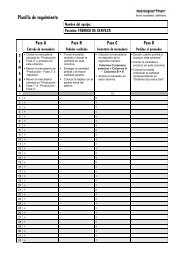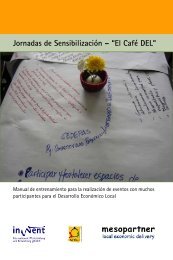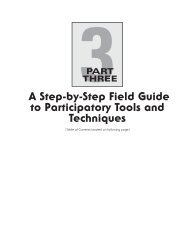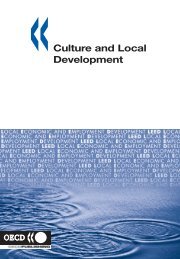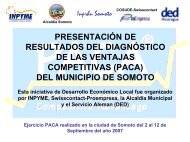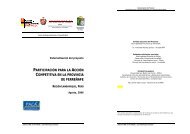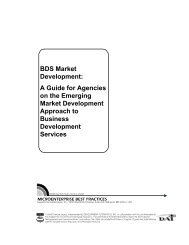R Chambers - Notes for participants in PRA-PLA course.pdf - PACA
R Chambers - Notes for participants in PRA-PLA course.pdf - PACA
R Chambers - Notes for participants in PRA-PLA course.pdf - PACA
Create successful ePaper yourself
Turn your PDF publications into a flip-book with our unique Google optimized e-Paper software.
6<br />
Sweden, Switzerland, Tadjikistan, Tanzania, Thailand, Tibet, Turkey, Uganda, UK,<br />
Uruguay, Uzbekistan, Venezuela, Vietnam, Yemen, Zambia and Zimbabwe .<br />
Elsewhere there must be much tak<strong>in</strong>g place which we do not know about.<br />
The approaches, methods and behaviours have proved applicable <strong>in</strong> many types of<br />
organisations. People <strong>in</strong> NGOs were the first ma<strong>in</strong> pioneers of <strong>PRA</strong> but many<br />
Government field organisations, tra<strong>in</strong><strong>in</strong>g <strong>in</strong>stitutes, and universities are now us<strong>in</strong>g and<br />
evolv<strong>in</strong>g variants of <strong>PRA</strong>/<strong>PLA</strong>. All or almost all major fund<strong>in</strong>g (donor and lender)<br />
organisations and INGOs have promoted, supported, and/or been challenged by, <strong>PRA</strong>.<br />
Applications are many <strong>in</strong>clud<strong>in</strong>g community- level (urban as well as rural) plann<strong>in</strong>g,<br />
women's programmes, client ("stakeholder") selection and deselection, health<br />
programmes, and adult empowerment and literacy (REFLECT) [<strong>for</strong> others see below].<br />
Policy applications through PPAs (participatory poverty assessments) have become<br />
common, and can be part of PRSPs (poverty reduction strategy papers, <strong>in</strong> heavily<br />
<strong>in</strong>debted countries). Tra<strong>in</strong><strong>in</strong>g <strong>in</strong>stitutes have adopted and adapted <strong>PRA</strong>/<strong>PLA</strong> <strong>for</strong> the<br />
fieldwork and field experience of their probationers and students. Many university<br />
faculty have been slow to learn, but pressure from students has been successful and<br />
<strong>PRA</strong>/<strong>PLA</strong> approaches are now be<strong>in</strong>g “taught” <strong>in</strong> universities. <strong>PRA</strong>/<strong>PLA</strong> methods are<br />
now widely used <strong>in</strong> research and have been used as alternatives to questionnaires to<br />
generate statistics.<br />
Concerns<br />
There has been a mass of bad practice (as well as a lot that is brilliant). Quality<br />
assurance has been a concern among practitioners and tra<strong>in</strong>ers throughout the 1990s<br />
and s<strong>in</strong>ce. Dangers and abuses have <strong>in</strong>cluded:<br />
• us<strong>in</strong>g the label without the substance!<br />
• fail<strong>in</strong>g to put behaviour and attitudes be<strong>for</strong>e methods!!<br />
• rush<strong>in</strong>g and dom<strong>in</strong>at<strong>in</strong>g <strong>in</strong> the field!!!<br />
• fund<strong>in</strong>g agencies’ demands <strong>for</strong> tra<strong>in</strong><strong>in</strong>g <strong>in</strong> a day or two, with lectur<strong>in</strong>g,<br />
without fieldwork, and then implementation <strong>in</strong> communities as a oneoff<br />
<strong>in</strong> a short time!!!!<br />
• fund<strong>in</strong>g agencies and governments demand<strong>in</strong>g <strong>in</strong>stant <strong>PRA</strong> on a large<br />
scale!!!!!!<br />
The labels "RRA", "<strong>PRA</strong>" and “<strong>PLA</strong>” have been used to justify and legitimate sloppy,<br />
biased, rushed and unself-critical work. Any approach or methods can be used badly,<br />
and RRA, <strong>PRA</strong> and <strong>PLA</strong> provide some excruciat<strong>in</strong>g examples of bad practice, usually<br />
driven by lender and donor agencies whose staff do not know what they are do<strong>in</strong>g.<br />
Abuses have been many: employ<strong>in</strong>g consultant tra<strong>in</strong>ers who are prepared to “tra<strong>in</strong>” <strong>in</strong><br />
a day or two; rigid, rout<strong>in</strong>ised applications; rush<strong>in</strong>g and dom<strong>in</strong>at<strong>in</strong>g <strong>in</strong> the field;<br />
community meet<strong>in</strong>gs dom<strong>in</strong>ated by big talkers, men and the local elite; tak<strong>in</strong>g local<br />
people's time without recompense; shopp<strong>in</strong>g lists of requests from communities;<br />
rais<strong>in</strong>g expectations which are not fulfilled; and rapid, disbursement-driven<br />
programmes seek<strong>in</strong>g to spend fast, creat<strong>in</strong>g dependence, and underm<strong>in</strong><strong>in</strong>g longer-term<br />
more susta<strong>in</strong>able ef<strong>for</strong>ts <strong>in</strong> other communities.<br />
Part of the problem is that fund<strong>in</strong>g agencies and Governments tend to want to go<br />
<strong>in</strong>stantly to scale, <strong>in</strong> hundreds, even thousands, of communities. So far I do not th<strong>in</strong>k<br />
any way has been found to do this both quickly and well, though there are promis<strong>in</strong>g<br />
developments <strong>in</strong> Rwanda with a community-based PPA and <strong>in</strong> Bangladesh with


